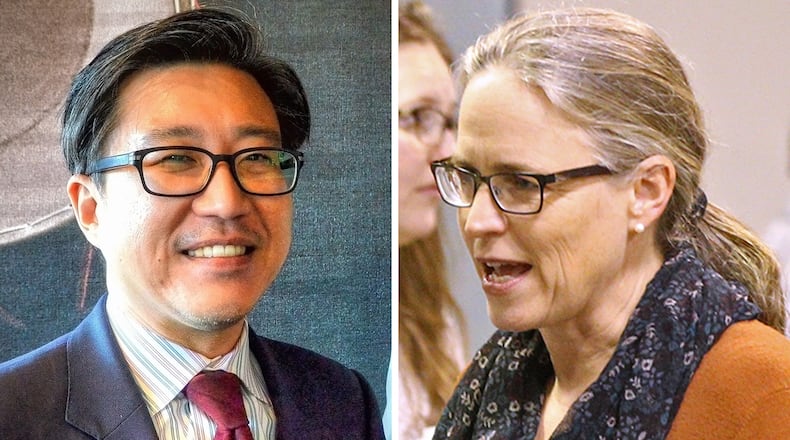Perhaps no congressional district in Georgia has seen demographic shifts quite as profound as the 7th.
Spanning portions of Gwinnett and Forsyth counties, the district was once lily white and deeply conservative. But an influx of immigrants, particularly in Gwinnett, has heralded a major political shift, demonstrated by Hillary Clinton’s win there in the 2016 presidential race.
Despite the changes, Republican U.S. Rep. Rob Woodall has easily cruised to re-election in recent years.
A bevy of Democrats stepped forward this spring to try to change that. Two of them — Carolyn Bourdeaux and David Kim — remain and will go head to head in a July 24 runoff for the chance to face Woodall this November.
Background
Bourdeaux: 48 years old; Yale University, University of Southern California and Syracuse University graduate; college professor, former Georgia budget official
Kim: 39 years old; Harvard University graduate; business owner, teen magazine publisher
Biggest claim to fame
Bourdeaux: Ran the Georgia Senate's budget office from 2007 to 2010.
Kim: Grew his tutoring company, C2 Education, into a national brand with more than $100 million in annual revenue.
Favorite talking points
Bourdeaux has made health care a main focus of her campaign. She said her father's experience with swelling health care costs and her own frustration with the GOP's effort to repeal and replace Obamacare drove her to run for office.
"I cannot sit behind my desk anymore," she told The Atlanta Journal-Constitution last summer as she announced her candidacy.
Bourdeaux hasn't been shy about courting female voters who have become one of the major driving forces in Democratic politics. She's campaigned on equal pay for men and women while promoting abortion rights and paid family medical leave.
Kim is the son of South Korean immigrants and frequently discusses how he's been able to live the American dream, putting himself through Harvard with a tutoring business that he quickly grew.
He’s touted the need for overhauling the country’s immigration laws “to enable those who want to contribute to our great American melting pot to come here legally and safely.” He’s also advocating for providing a pathway to citizenship for so-called Dreamers, young people who were brought to the U.S. illegally as children.
What they don’t want to talk about
Bourdeaux's opponent has sought to tie her to the policies of the Republican-led state Legislature, where she worked during the height of the Great Recession. In order to adhere to the balanced budget law, Georgia lawmakers slimmed the state's budget as revenue shrunk. Bourdeaux said she was serving in a nonpartisan role as a budget official and that as a staff member her hands were tied.
Bourdeaux has also been slammed by Kim for being anti-immigrant after she criticized him for not voting in previous elections.
“When Carolyn Bordeaux attacks me, she is attacking millions of first-generation immigrants and minorities who have not felt welcome in the process,” Kim said.
Kim, meanwhile, has been denounced by Bourdeaux as a fair-weather politico for his lack of voting history.
"It is a big jump to go from never having voted to running for the U.S. Congress," Bourdeaux told Kim in a televised debate this spring. Voting, she said, is a "sacred trust."
Bourdeaux said Kim was "appropriat(ing) the violence and tragedies that African-Americans had to endure" to "score cheap political points" after he accused her campaign of "voter suppression" earlier this month.
Who’s funding them?
Bourdeaux has outfundraised all of her 7th District opponents, including Woodall, for much of the 2018 cycle. That's due in no small part to the political action committee Emily's List, which seeks to elect Democratic women who believe in abortion rights. Much of her money has come from out of state.
Kim has self-funded a substantial chunk of his campaign. And while he entered the race with $250,000 in seed money — more than half of it from his own wallet — he's struggled with fundraising since then.
What they’re about to get into
The winner of the runoff will take on Woodall on Nov. 6.
The four-term Republican is not as strong a fundraiser as many of his U.S. House colleagues from Georgia, but he’s still had time to put money away ahead of the general election. He kicked off July with roughly $529,000 in the bank, according to his campaign’s latest filing.
Should either candidate defeat him, Bourdeaux or Kim would need to almost immediately weigh in on whether to extend Nancy Pelosi's tenure as the House Democratic leader.
Another major question is how to approach President Donald Trump. Should Democrats retake control of the House in November, the party will also need to decide whether to pursue impeachment proceedings against him. That prospect has already deeply divided the Democratic Party.
Bourdeaux previously said she had “very serious concerns” about Trump’s “conflicts of interest,” but she also said Special Counsel Robert Mueller’s inquiry should continue before making any decisions. Kim has also endorsed waiting for Mueller’s investigation to conclude.
Why it matters
The number of Democrats serving in the Georgia delegation has shrunk over the past two decades. Now only four are left in a group of 16. Winning back a seat would be a major boost for the party.
A November victory by Kim or Bourdeaux would also be a major victory for the national Democratic Party. As recently as two years ago, the 7th District was seen as a “safe” Republican seat.
2018 campaign
As part of its coverage of the issues and the candidates in this busy election year, The Atlanta Journal-Constitution this week is offering breakdowns of the races in the July 24 runoff. Look for more at PoliticallyGeorgia.com.
About the Author
Keep Reading
The Latest
Featured




